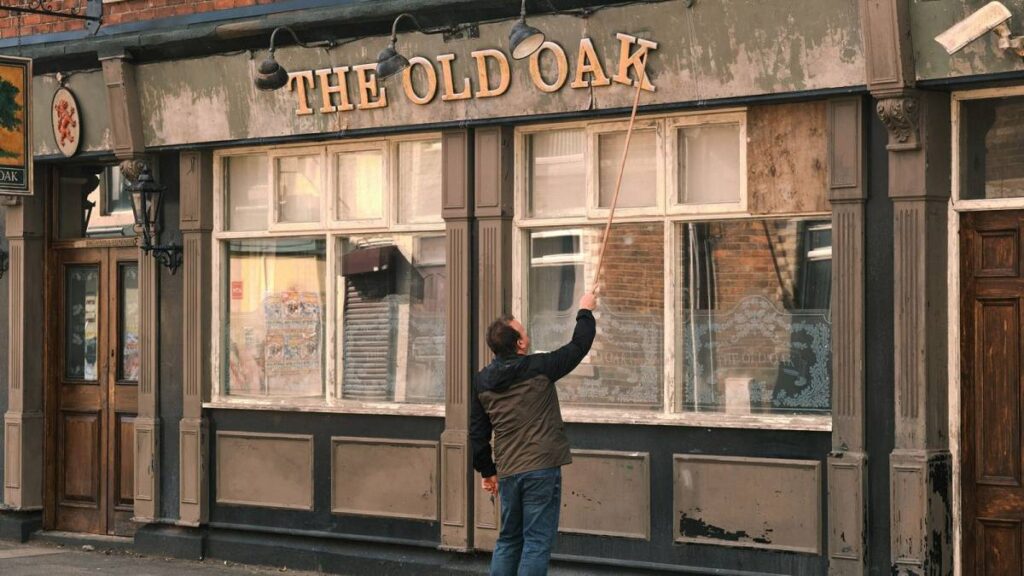OLD OAK, THE
(director: Ken Loach; screenwriter: Paul Laverty; cinematographer: Robbie Ryan; editor: Jonathan Morris; music: George Fenton; cast: Dave Turner (TJ (Tommy Joe) Ballantyne), Ebla Mari (Yara), Claire Rodgerson (Laura), Trevor Fox (Charlie), Debbie Honeywood (Tania), Andy Dawson (Micky), Cole Tait (Eddy), Neil Leiper (Rocco), Chris McGlade (Vic), Amna Al Ali (Fatima), Jordan Louis (Gary), Jen Patterson (Maggie), Chris Gotts (Jaffa Cake); running time: 113; MPAA Rating: NR; producers: Rebecca O’Brien; Sixteen Films/BBC; 2023-UK/France/Belgium-in English & Arabic, with English subtitles)
“A humanistic sob story preaching hope even if there’s little hope.”
Reviewed by Dennis Schwartz
The 87-year-old master of social realism, the Brit filmmaker Ken Loach (“Kes”/”Poor Cow”) of kitchen sink drama fame, directs his announced last film. It’s a bleak but uplifting film that’s predictable as a humanistic sob story preaching hope even if there’s little hope. It’s tautly scripted by his longtime collaborator Paul Laverty.
It’s an all too familiar immigration story that conveys nothing new we don’t already know about immigrants of color feeling unwanted in a racist white community that lets them know they’re not wanted.
The young English-speaking woman, an aspiring photographer, Yara (Ebla Mari), and her Syrian family (elderly mother (Amna Al Ali) and brother) relocate to England in 2016, while her father is imprisoned in Syria during the civil war and his fate is uncertain. The family after fleeing the atrocities of the despotic Assad regime, settle down in an unnamed decaying village outside of County Durham.
When a local racist bully (Neil Leiper) breaks Yara’s camera, a friendly pub owner TJ Ballantyne (Dave Turner) gives her one of his old cameras as a replacement.
The mines in Northeast England have closed, and housing is cheap and readily available. This enables the Syrian refugees to cheaply rent homes to live in from the greedy real estate people that bought the homes on the cheap from the out of work miners.
The middle-aged divorced TJ Ballantyne, alienated from his grown son, owns the barely surviving Old Oak, the only pub left in the rundown British village.
Despite TJ’s budding father-daughter friendship with the refugee Yara, he feels for his lifetime friends, the hard-pressed locals who lost their way of life because of the mine closings– while the Syrians have left their country for a new one (which is their burden of hardship).
Both groups live on the economic margins of society, and worry about their futures. But the locals are not accepting of the newcomers and have a racial hatred for them and no sympathy for their plight. They blame TJ for not siding with them and allowing them to hold meetings in the pub’s backroom, while the pub operates a food bank to help both the refugees and idle miners with free meals (which the locals reject).
When the locals vent against the Syrians with vicious racist slurs, and TJ is called out by the locals for siding with the outsiders, he realizes by remaining silent all these years there’s been no voice raised in the community against racism.
It’s an earnest film, one that has to be told until the world finally learns hatred harms everyone. The film brings with it Loach’s usual compassionate and unimpeachable message that people must learn how to live together or suffer the consequences. The well-acted film, with a mixture of professional and non-professional actors, has its moments when it tells us what the bigots can’t hear but should.
It played at the Cannes Film Festival.

REVIEWED ON 6/18/2024 GRADE: B